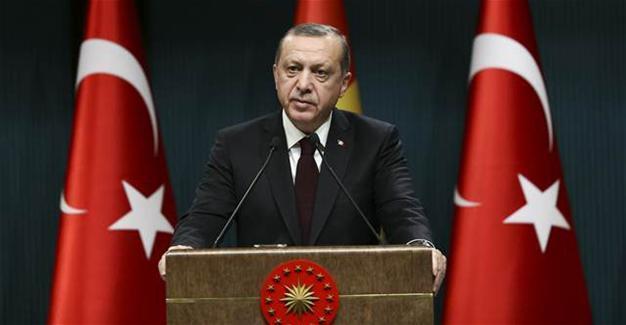Erdoğan says US-led coalition gives support to terrorist groups in Syria
ANKARA

AA Photo
Turkish President Recep Tayyip Erdoğan has said he has evidence that U.S.-led coalition forces have given support to terrorist groups, including the Islamic State of Iraq and the Levant (ISIL) and Syrian Kurdish forces.“They [anti-ISIL coalition forces] were accusing us of supporting Daesh,” Erdoğan told a press conference in Ankara alongside visiting Guinean President Alpha Conde on Dec. 27, using an Arabic acronym for ISIL.
“Now they’ve all vanished and they’re giving support to terrorist groups including Daesh, YPG and the PYD.
It’s very clear. We have confirmed evidence, with pictures, photos and videos,” he said.
Turkey regards the Syrian Kurdish Democratic Union Party (PYD) and its military wing the People’s Protection Unit (YPG) as terror organizations due to their links to the outlawed Kurdistan Workers’ Party (PKK), with which it has been fighting against since mid-1980s.
Turkey and the U.S. are at odds with the designation of the PYD and YPG, as the U.S. sees the two groups as “reliable” partners in their fight against ISIL in Syria. The U.S. along with the European Union designates the PKK as a terrorist organization.
At least 40 Turkish troops have died in Turkey’s Euphrates Shield operation since it was launched on Aug. 24 to clear the country’s border with Syria from terror organizations, which include ISIL, as well as the PYD and YPG.
Later in the day, the U.S. State Department rejected as “ludicrous” accusations by Erdoğan that the U.S.-led coalition supported ISIL, though making a distinction to the support given to the Syrian Democratic Forces (SDF).
“Daesh – I said that from the outright. That’s just ludicrous. I don’t know where that comes from,” said State Department spokesman Mark Toner during a daily briefing on Dec. 27.
While rejecting support for ISIL, Toner reiterated U.S.’ stance regarding the SDF.
The PYD and YPG are part of the SDF, along with Syrian Arab forces, which are also fighting ISIL in Syria. The U.S.-backed SDF is currently conducting an operation to liberate ISIL’s capital of Raqqa in Syria.
“So we do provide tactical support to the Syrian Democratic Forces. There’s no surprise there. We’ve been very transparent about that. That’s to help us all achieve our shared goal of defeating Daesh. The Syrian Democratic Forces have, as we’ve said many times, proven to be a very capable force against Daesh, and our support for them – again, our tactical support for them will continue,” Toner said.
“As we’ve also said before, we’ve never provided weapons to the YPG. And we have provided equipment to vetted Arab elements of the Syrian Democratic Forces. This equipment has included ammunition and other tactical equipment to assist the coalition’s counter-ISIL operations. But let me be clear that we reject any group providing support to the PKK or enabling its terrorist campaign within Turkey,” he added.
‘Coalition forces not keeping promises’ in al-Bab, says Erdoğan
Erdoğan also accused the coalition forces of not supporting Turkey in its campaign to liberate northern Syria town of al-Bab from ISIL militants.
“The coalition forces are unfortunately not keeping their promises,” said Erdoğan, adding that coalition forces were displaying a different stance than previously promised.
“Whether they do or they don’t, we will continue along this path in a determined way. There is no going back on the path we have set out on,” he added.
Turkey has met the fiercest resistance yet of the campaign in the fight for al-Bab, some 25 kilometers south of the Turkish border.
Commenting on a question regarding Erdoğan’s remarks, Toner said the U.S. was in close contact with Turkey in regards to its Euphrates Shield operation.
“We have provided support to Turkey for operations to clear its border of ISIL, and that support is ongoing.
But as I said, they’re now driving on al-Bab. It’s a tough fight. We’re talking to them about how we can help them in their efforts,” Toner said, adding that the U.S. was in close contact with Turkey, especially via Brett McGurk, the top U.S. envoy to the 60-nation coalition.
















